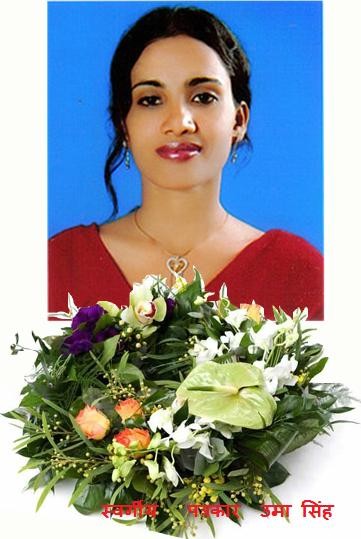Bathroom,
If you are really interested to judge the choices we made in the past, here is how it was.
With yet to be competent leadership of the parliamentary parties on one hand and the irrepressible/irreversible momentum for pro-republic movement on the other at the time around Jana-andolan, there were three dumb choices and one right one:
· The dumbest choice:
(as made by people like Bathroom and some Sajhaites)
Support the king or at least oppose the pro-republic movement
· Dumber Choice:
(as made by the old generation/elite Nepalese)
Support the parliament parties anyway
· Dumb choice:
(as made by the senior citizens of the Citizen Movement )
Oppose monarchy and pay lip service or keep quite about other parties’ inadequacies
· Right choice:
(Made by Nepe and not too many people)
Support the pro-republic movement without being complacent about the inadequacies of the leadership of political parties and Maoist.
Now I would like to share, particularly with CEO ji, the choice I had made and my share of endeavor to influence the movers and shakers I had access to at that time.
Below are two pieces written to an influencing aguwa of then citizen’s movement (posted in Nepal Democracy Forum).
Please note in the highlighted part how I had anticipated the current situation (Maoist running over the political parties and running the show without being fully qualified to) and suggested the solution (empowerment of the political parties through their ideological and organizational reform)
From: DK
To: nepaldemocracy@googlegroups.com
Date: Mon, 13 Feb 2006 02:11:49 -0000
Subject: Re: belated response to ZZji
X-jee,
Thank you for your reply. (You mixed up ZZ-jee with me. However, I
can separate my part in your reply).
I know you are a very busy man. So I will try to be brief and talk
about only one major point in this follow up.
My major question, if I rephrase, was whether Girija Prasad Koirala jyu
(No, not the president of NC, but the Commander of the movement for
democracy. I would also add that it is not limited to physical Girija
Prasad Koirala jyu.) is competent ENOUGH to lead and successfully
conclude the movement. I am assuming that it is now fairly certain that
the movement will not conclude in any other way than re-writing the
constitution.
X-jee, I gather from your reply that you think that the movement is
able to go ahead with the status quo, if not a leadership in a real
sense, of Girija Babu. Let's hope you are right.
However, the way I see it, there are two problems, one old and the
other one new, regarding Girija Babu's leadership/status quo for the
movement.
OLD PROBLEM: Girija Babu's supreme status in the movement is repelling
or failing to attract the common people to the movement.
My proof:
(i) the vast number of common people who are still reluctant to join
political movement (A quick interview with a small sample of them will
certainly verify my assertion)
(ii) recent dramatic increase in people's participation in political
rallies have either associated with pro-republic civil society's
initiative (the earlier phase) or with the Maoists (needless to
emphasize that they are pro-republic) tacit arrival to the movement in
understanding (post-12 points MoU rallies). None of the crowed rallies
were inspired by Girija Babu.
(Here I want to make a point to ZZ-jee who actually made a point
from this that the movement has passed beyond the question of Girija
Babu's leadership. And my point is that, yes, it has, for this mass, at
least mentally. However this mass is still physically at the mercy of
the political decisions Girija Babu makes. Then, there is a vast bigger
mass, described in #(i) above, that has still issue with what Girija
Babu's supreme status in the movement represents.)
NEW PROBLEM: The Maoists are stealing the show.
I do not have to discuss this one with X-jee. Nobody understands
this one better than X-jee who is following every development so
intimately, both professionally and intellectually.
The Maoists have landed. And they are not coming empty hand. They are
coming with a clear goal, solid roadmap, absolute determination and an
army. Everything (except the army) that people were so desperately
looking for and everything that Girija Babu (the leadership) failed to
give.
I think It is emergency time for political parties and the movement
that wants to be led by them. The movement got to find a competent and
aggressively competitive (to the Maoists) leadership before it is too
late.
I rest my case. However, I am restless. I am restless thinking if
people (and civil society) have already started to give up on Girija
Babu and look up to the reformed Maoists.
I will be checking all papers and pratikriyas.
Regards,
DK
http://groups.google.com/group/nepaldemocracy/msg/01a5ec53f104a007?hl=en
From: DK
To: nepaldemocracy@googlegroups.com
Date: Thu, 09 Feb 2006 16:43:58 -0500
Subject: Re: [ND] Re: DEMAND FOR MAOIST CEASEFIRE
X-jee and all friends,
I have been carrying a serious complaints about lack of STRINGENCY
in pro-democracy activism of the civil society in Nepal.
Before explaining my complaint, however, I would like to talk about
the things I admire Nepal's civil society (CS) about.
I admire CS for it's strong grasp that peace and democracy are
connected. SC no more talks about absolute or abstract peace in
Nepal. Thanks to King Gyanendra's take over, it has opened
everybody's eyes. Otherwise the discourse on peace before Oct 2002
used to be frustratingly abstract, so much so that Baburam Bhattarai
used to ridicule by pointing that.
I also admire CS for getting out of "twin-pillars" box of democracy.
Once again with due thanks to King Gyanendra for revealing the
bricks one pillar is actually made up of.
I also admire CS for finally recognizing/identifying THE PEOPLE
(Constituent Assembly/ Popular movement ) as the party that has
the ultimate legitimacy and power to resolve the conflict the way
it wants.
However, there seems some confusion about it's stance on the
nature of movement, political leadership and, more importantly,
about post-conflict building of the nation.
And this confusion, the way I see it, is not due to lack of knowledge
about democracy or due to lack of intelligence to evaluate leadership
or due to lack of imagination to speculate about future.
This confusion, the way I see it, is due to being unsure about whether
STRINGENCY or LAXNESS is more helpful to build a political
movement. Err.. , No, actually CS seems to believe that STRINGENCY
towards the perceived bigger enemy and LAXNESS towards lesser
enemy is the way to go.
That might be a good strategy for other situations in life, but not for the
movement for democracy in Nepal.
The movement for democracy in Nepal is not a uni-dimensional movement
for "restoration" or even "establishment" of democracy.
The movement for democracy in Nepal is a multi-dimensional
(three-dimensional, to be exact) movement for "re-defining" democracy.
Yes, "re-defining", but not really in unlimited way. The way democracy
has come to this point of our history for re-definition, there are only
THREE elements to be fixed. Let's say, we have three anti-democracy
elements to reject. That's all. That will complete the job. The three
anti-democracy elements that need to be rejected by our democracy are,
1. Illegitimate Ambition (king's)
2. Extremism (Maoists')
3. Unpopularity (Political leadership's)
These three elements are inter-dependent. As a matter of fact, the
stalemate we talk about is the stalemate of ambition, extremism and
unpopularity of the King, the Maoists and the supreme leadership of
the major party/ies, respectively. Being lax or apologetic or prioritized
about one and stringent or militant about another will not work,
because that will make you one of the parties itself.
The problems of Nepal's democracy is extremely clear
[to general mass]. So forget about LAXNESS. You got to
be STRINGENT to every anti-democratic element and parties.
Otherwise you won't get people's trust. And without people's
trust, you can only go so far.
CS in Nepal is the most trusted among all organized things at the
moment. However, if it fails to exhibit it's stringent approach as I
described above, I am afraid it is going to lose that trust soon. That
will be the most disastrous thing to happen.
So, I think, CS has one extremely rigorous test to pass/ show to
people, which is that it is not soft to any of the three anti-democratic
characters of three political payers in Nepal.
CS needs to do the following three things rigorously, simultaneously
and with perseverance,
1. Reject King's ambition (at the moment this is only thing CS is
rigorous about)
2. Reject Maoist's extremism ( what CS is doing is not stringent enough)
3. Reject unpopular leaders of the leading parties (this is what CS is not
sure about to do).
Regarding (1), no suggestion is necessary. CS is doing great.
Regarding (2), I am glad to hear CS's request (make that a demand)
to the Maoists for a seize-fire. Now, what is left is a demand that
Maoists issue a public pratigya-patra declaring "multi-party
democracy" as their final and unalterable principle from now on.
Regarding (3), Demand political parties to give leave to leaders
convicted by CIAA for now and find a new commander for
Loktantrik andolan. Girija Prasad Koirala is incompetent for the job.
If CS has guts to do all of the above karmas, then all good things
will follow. We do not need to worry. "Karmanye va dhikarasthe,
Ma phaleshu kadachana".
Apurna karma garee, purna phal ko asha rakhna chhadaun. अपूर्ण कर्म गरी पूर्ण फलको आसा राख्न छाडौं ।
Sincerely,
DK
http://groups.google.com/group/nepaldemocracy/msg/f74fe1a1cb76043d?hl=en


















